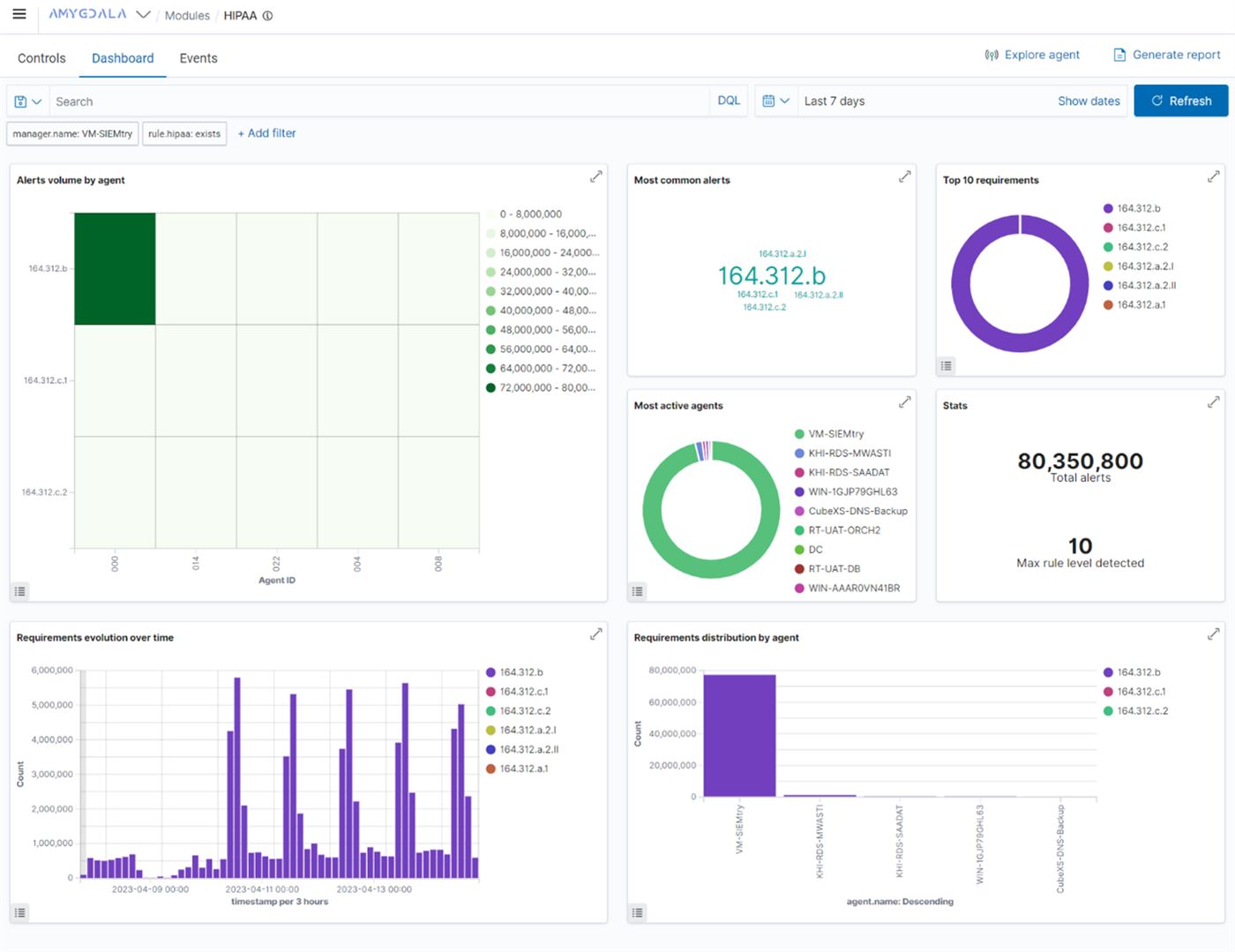Regulatory compliance
Payment Card Industry Security Standard (PCI DSS): Amygdala XDR® offers FIM and IDS capabilities that help organizations meet the PCI DSS requirements for file integrity monitoring and intrusion detection and prevention.
General Data Protection Regulation (GDPR)
Amygdala XDR®'s log analysis and FIM capabilities help organizations comply with GDPR requirements for data protection and incident response.
Health Insurance Portability and Accountability Act (HIPAA)
Amygdala XDR®'s log analysis and IDS capabilities help healthcare organizations comply with HIPAA requirements for security monitoring and incident response.
Federal Risk and Authorization Management Program (FedRAMP)
Amygdala XDR® aligns with the NIST Cybersecurity Framework, which is a set of guidelines for managing and reducing cybersecurity risk.

Technical Description
The regulatory compliance module of Amygdala XDR® is designed to help organizations ensure that they comply with various security standards and regulations, such as PCI DSS, HIPAA, GDPR, and ISO 27001. This module provides a set of predefined rules and checks that are specific to each regulation and allows users to create customized policies that meet their specific needs.
The module’s functionality is based on the concept of auditing, which involves collecting data about the system’s configuration, events, and activities, and comparing them to a set of predefined rules to determine compliance status. The regulatory compliance module collects data from various sources, including system logs, network traffic, and system configuration files, and uses a combination of signature-based and anomaly-based detection techniques to identify potential compliance violations.
The module’s architecture consists of three main components: the data collection agent, the compliance engine, and the reporting and alerting system. The data collection agent is responsible for collecting data from various sources and forwarding it to the compliance engine. The compliance engine processes the collected data and compares it to the predefined rules and policies to determine compliance status. The reporting and alerting system provides real-time alerts and reports on compliance violations.
The compliance module’s predefined rules and policies cover a wide range of security controls, including access control, authentication, encryption, network security, and audit trails. These rules and policies are customizable, allowing organizations to tailor them to their specific needs and requirements.
The module provides real-time alerts and reports on compliance violations, allowing organizations to quickly identify and remediate issues. It also provides detailed reports and audit trails that can be used to demonstrate compliance with regulations to auditors and regulators.
Features
The regulatory compliance module of the Amygdala XDR® is a key component of the platform, providing features such as:
Compliance monitoring
The regulatory compliance module of Amygdala XDR® helps organizations monitor their compliance with various security standards and regulations, such as PCI DSS, HIPAA, GDPR, and ISO 27001.
Customizable policies
The module allows users to create customized compliance policies that are specific to their organization's needs and regulatory requirements.
Automated compliance checks
The compliance module automates compliance checks to ensure that organizations are meeting the requirements of their chosen regulations. This helps to reduce the risk of non-compliance and associated penalties.
Real-time alerts
The compliance module provides real-time alerts for compliance violations, enabling organizations to quickly remediate any issues and maintain compliance.
Centralized management
The module provides a centralized dashboard for managing compliance, making it easy for organizations to view compliance status, policy violations, and remediation actions.
Reporting and audit trails
The compliance module provides detailed reports and audit trails that can be used to demonstrate compliance with regulations to auditors and regulators.
Integration with other Amygdala XDR® modules
The compliance module is fully integrated with other Amygdala XDR® modules, including intrusion detection, vulnerability assessment, and log analysis, providing a comprehensive security monitoring solution.
Technology-Supported, Protocols
The regulatory compliance module of the Amygdala XDR® supports a variety of technologies and protocols for collecting data and performing compliance checks. These include:
Syslog
Amygdala XDR® can collect data from systems that send syslog messages, which is a standard protocol for sending log messages across a network.
Windows Event Log
Amygdala XDR® can collect data from the Windows Event Log, which is a centralized log service built into the Windows operating system.
File Integrity Monitoring
Amygdala XDR® can monitor changes to system files and directories using file integrity monitoring (FIM) techniques, such as checksums and digital signatures.
Network Traffic Analysis
Amygdala XDR® can perform compliance checks on network traffic using techniques such as deep packet inspection (DPI) and network intrusion detection (NIDS).
Configuration Auditing
Amygdala XDR® can perform compliance checks on system configurations using configuration auditing techniques, such as comparing system configurations to predefined baselines.
Application Logs
Amygdala XDR® can collect data from application logs, including logs generated by web servers, databases, and other applications.
Module Dependency
The regulatory compliance module of the Amygdala XDR has some module dependencies that are required for its proper functioning. These dependencies are as follows:
Amygdala XDR® API
The regulatory compliance module depends on the Amygdala XDR® API, which provides a programmatic interface for managing the Amygdala XDR platform. The API is used by the compliance module to retrieve compliance-related data, such as compliance reports and alerts.
Amygdala XDR® Agents
The regulatory compliance module depends on the Amygdala XDR® agents, which are installed on the systems being monitored. The agents are responsible for collecting data from the monitored systems and forwarding it to the Amygdala XDR® Manager for processing.
Amygdala XDR® Manager
The regulatory compliance module depends on the Amygdala XDR® Manager, which is the central component of the Amygdala XDR® platform. The Amygdala XDR® Manager is responsible for receiving and processing data from data sources, and for forwarding compliance-related data to the compliance module.

IT Performance and Security Solution Provider

